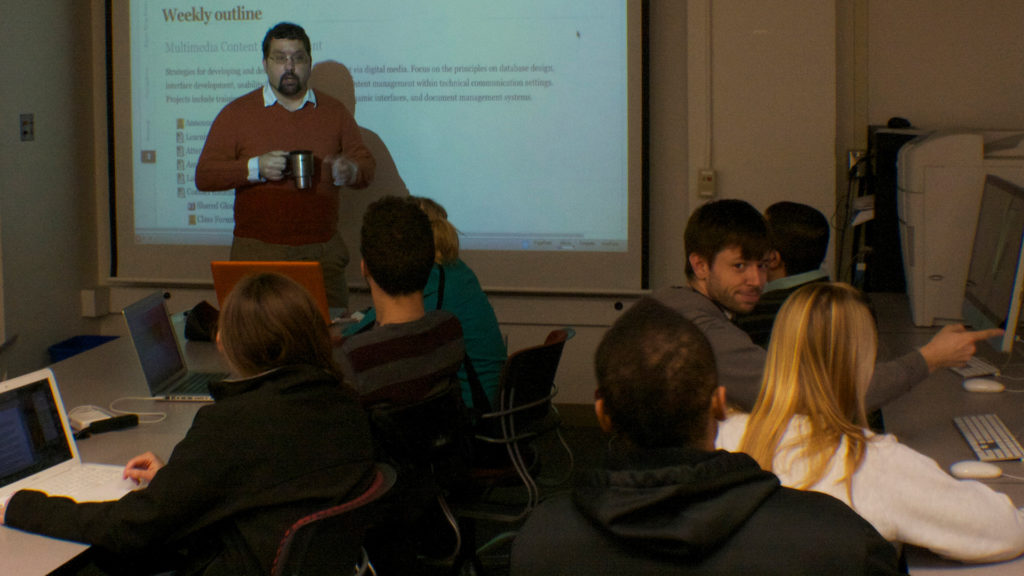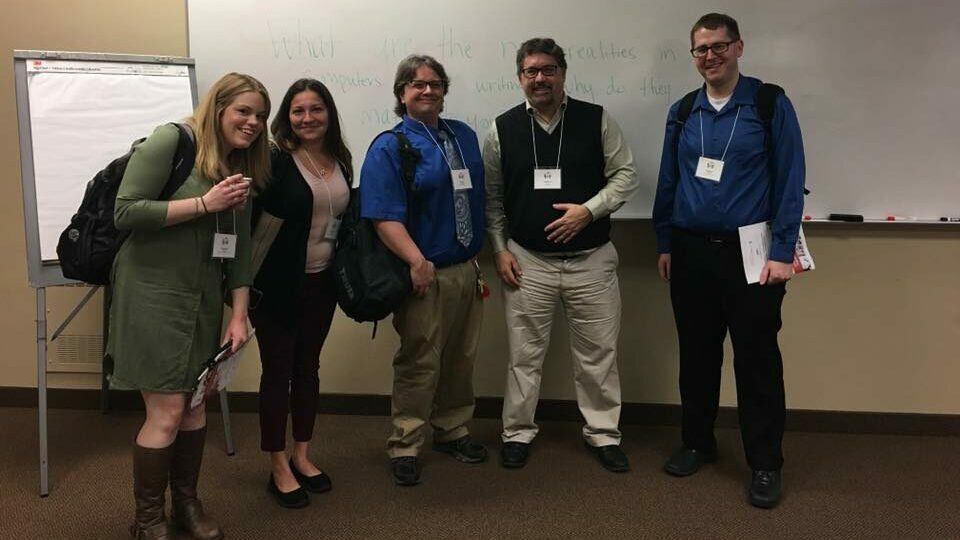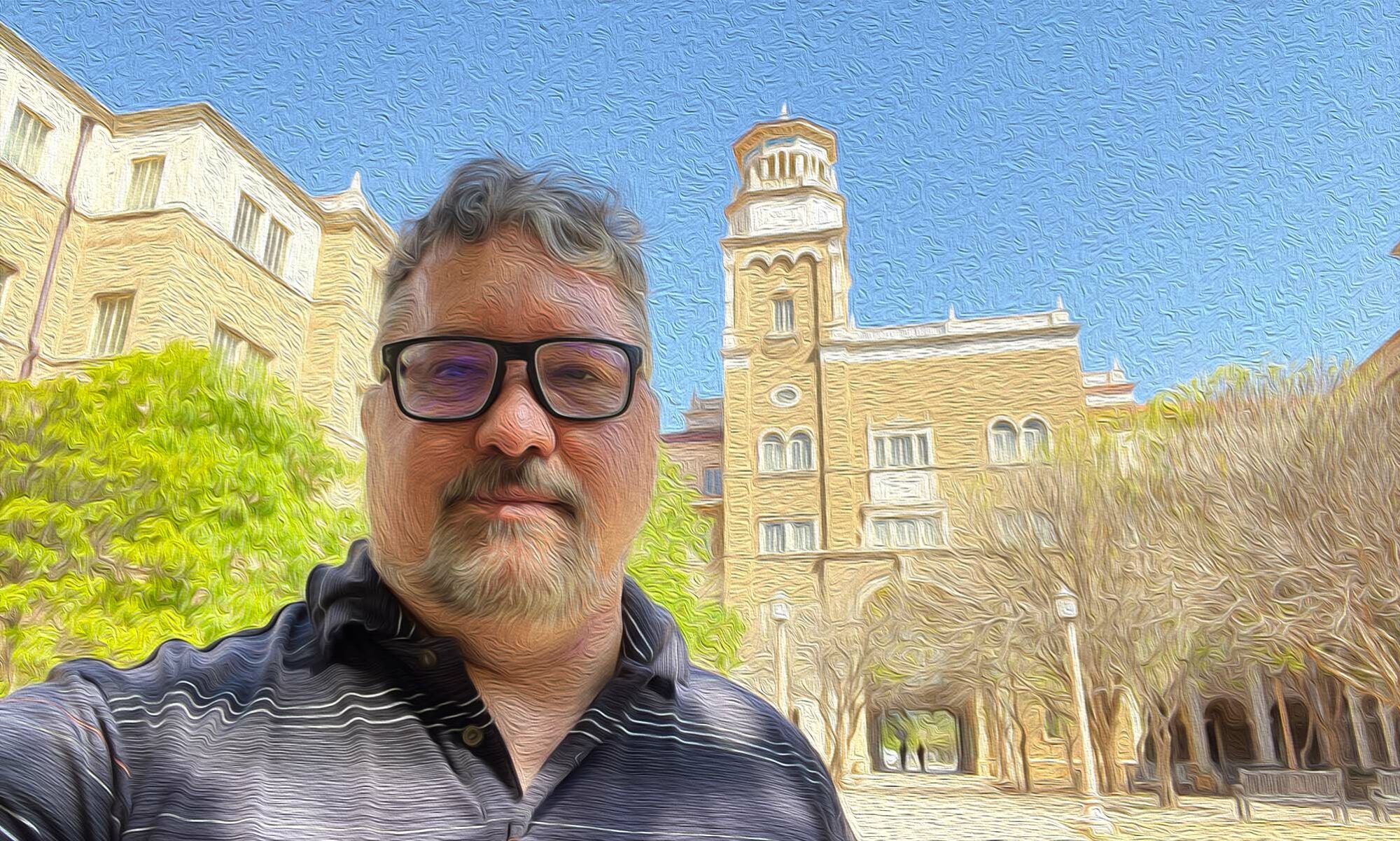I love teaching.
I teach courses about new media in workplace and technical communication, including courses in web design, content management systems, nonlinear video editing, film theory, social media, and usability. I’ve become sort of a “utility infielder” in technical communication, so I often cover any classes needed by our program; that means I get to teach more preps than some of my colleagues. I love that!

Courses I Regularly Teach
- ENGL 5376: Online Publishing. This graduate course will provide an overview of the practical and theoretical aspects of designing effective online communication and websites. Specifically, our work will focus on process and planning, content development, site structure, navigation, visual design, interface design, usability, and accessibility.
- ENGL 4367/5373: Instructional Design for Technical Communicators. This course introduces students to the principles and processes involved in developing instructional content for professional settings. It includes design thinking philosophy, user and task analysis, learning theories, and methods of usability evaluation. The course also covers theoretical approaches to technical instructions, including instructional architecture strategies, human-centered design principles, practical learning objects, and other methods.
- ENGL 4365/5377: Multimedia for Technical Communication. This course studies multimedia production, including interactive multimedia, as they are used in workplace, technical, and professional purposes. Students learn the systems and applications that create and edit interactive media. We focus on both practical and theoretical elements of media in both education and industry, teaching audiences to perform complex tasks. Class assignments involve work with hypermedia, lighting, audio, and nonlinear video production and editing.
- ENGL 5374: Technical Editing. In this class, students will learn how to edit technical documents, from proofreading for errors at the surface to ensuring that the document contains appropriate content, organization, and visuals for its audiences. Students will also learn how to use traditional editing marks, editing functions within word processors, and principles of layout and design. Finally, students will learn about the profession of editing and develop pieces to support their careers.
- ENGL 3368: Designing for the Web. The course will cover practical skills with various software tools and scripting languages, including HTML, CSS, and JavaScript. Assignments
will primarily focus on analyzing and developing online content using a variety of tools and development methods. The course will also address theoretical issues in online publishing, content management, and technology. - ENGL 5371: Foundations of Technical Communication. A hybrid course (both in-person and synchronous online) that will focus on theoretical and practical issues in technical communication, giving students a strong basis from which to continue their graduate studies and work in the profession.
- ENGL 4368: Advanced Web Design / Digital Content Management. This hybrid course (both in-person and synchronous online) will teach strategies for developing and delivering multimodal content via digital media. Focusing on back-end web design, the course will cover principles of database design, interface development, usability testing, and collaborative content management within professional communication settings.
- English 549: Multimedia Design in Professional Communication. Rhetorical principles of interactive multimedia design, such as those in DVDs, Blu-Ray videos, and streaming web multimedia. Practical understanding of computer applications used in interactive multimedia development. Focus on theoretical and practical elements of producing multimedia training in both education and industry. Work with interactive hypertext, digital audio, and nonlinear video editing.
- English 529: Content Management. Strategies for developing and delivering multimodal content via digital media. Focus on the principles of database design, interface development, usability testing, and collaborative content management within professional communication settings.
- English 505: User Experience Architecture and Testing. Seminar course examining user experience (UX) interface design and development in technical communication. Focus is on the UX project cycle: creating userfaces, conducting user research, system testing, and implementing data-driven results.
- English 477: Seminar in Technical Communication. Intensive study of a selected topic that bridges theory and practice in technical communication. Required project that contributes to the understanding of an emerging issue in the profession.
- English 411: Technology, Rhetoric, and Professional Communication. Seminar course on the implication of technologies, especially computer technology, for the writing and reading of business, technical, and academic texts. Extensive reading, discussion, and writing on selected technology-related topics.
- English 335: Studies in Film. Seminar course on the implication of technologies, especially computer technology, for the writing and reading of business, technical, and academic texts. Extensive reading, discussion, and writing on selected technology-related topics.
- English 314: Technical Communication. Rhetorical concepts and processes to successfully communicate technical information individually and collaboratively via written, oral, visual, and electronic modes. Emphasizes the major strategies for analyzing expert and lay audiences and adapting information to those audiences. Covers developing and designing usable technical documentation, visualizing data, and presenting technical information orally.
- English 313: Rhetorical Website Design. Rhetorical principles of multimodal composing in hypertextual environments. Focus on writing according to web style guidelines, employing cascading stylesheets for layout and design, and using principles of information architecture to determine optimal site structure. Final project involves constructing interactive client site using latest web standards.
- English 302: Business Communication. Rhetorical concepts and processes to successfully communicate individually and collaboratively via written, oral, visual, and electronic modes across a range of business disciplines. Covers strategies for analyzing audiences internal and external to an organization in order to communicate positive, neutral, and negative messages clearly, completely, correctly, and ethically; save an audience’s time; and create goodwill.
- English 250: Written, Oral, Visual, and Electronic Composition. Analyzing, composing, and reflecting on written, oral, visual, and electronic (WOVE) discourse within academic, civic, and cultural contexts. Emphasis on supporting a claim and using primary and secondary sources. Continued development of communication portfolio.
Mentorship
I’ve had some success as an academic, largely the result of excellent mentoring by senior scholars who took time to help me in every stage of my career. I won’t name them all here, but those of you who know me socially know I quite enjoy telling stories about the fabulous advice and support I’ve received from mentors who have become my friends.
Apparently I’m older now, though. So I guess it’s my turn.
And I’ve found that quite enjoy helping junior scholars develop into colleagues who will help to change the world.

When I first took the faculty position here, I noticed that ISU students had a tendency to defer to faculty. (We had very distinguished senior scholars, so I completely understood.)
But I put a comfortable couch just inside the door of my office, to encourage students who might want to chat to stop in and talk whenever they wished. It seems to have worked; since I’ve come to ISU, I’ve become very active on grad student committees. I’ve served as chair for seven Ph.D. committees, and served on 23 more. I’ve served on three M.S. or M.F.A. committees. I’ve chaired 13 M.A. committees, and served on 23 more. I spend a lot of time mentoring graduate students, and consider that a significant part of my teaching.
In recent years, I’ve found mentoring undergraduates today is much like mentoring graduate students was in the early 2000s. Undergrads these days are more focused on their future careers, and benefit from mentoring at the same time they are learning about the material in each course.
I also teach occasional independent studies, to help students who wish to study topics not offered by any courses in the university catalog, and most semesters I have both undergrad and graduate students (especially in a course that covers writing their theses/dissertations in their final semester of study).
TL;DR: I love teaching.
